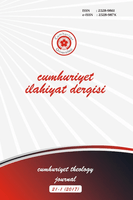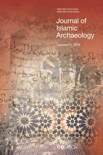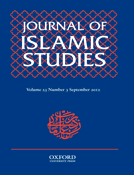
Eskiyeni
Scope & Guideline
Fostering Insightful Discourse on Spirituality and Ethics
Introduction
Aims and Scopes
- Islamic Law and Jurisprudence:
The journal emphasizes research in Islamic jurisprudence, exploring various schools of thought and their applications in contemporary contexts, such as women's rights and religious practices. - Religious Education and Youth Engagement:
A significant focus is placed on the role of religious education in shaping youth perspectives, including studies on mosque youth centers and the experiences of young Muslims. - Philosophical and Theological Inquiry:
The journal promotes philosophical discussions related to theology, including the nature of God, metaphysical inquiries, and the relationship between science and religion. - Cultural and Literary Studies:
Research on Islamic literature, poetry, and cultural practices is a core area, reflecting on historical texts and their modern interpretations. - Interdisciplinary Approaches:
The journal encourages interdisciplinary studies that connect Islamic thought with other fields such as psychology, sociology, and ethics, fostering a holistic understanding of religious phenomena.
Trending and Emerging
- Impact of Digitalization on Religion:
Recent papers increasingly address the effects of digitalization on religious practices and beliefs, reflecting a growing interest in how technology shapes spirituality and community engagement. - Psychology and Religion:
There is a rising trend in exploring the intersections of psychology and religious coping mechanisms, particularly in the context of mental health and trauma recovery, highlighting the relevance of psychological frameworks in religious studies. - Women’s Roles in Islam:
Research focusing on women's experiences and roles within Islamic contexts is gaining prominence, with studies examining religious practices, legal exemptions, and educational initiatives aimed at women. - Interdisciplinary Approaches to Theology:
The journal is increasingly publishing works that integrate theology with other disciplines such as sociology, philosophy, and ethics, reflecting a trend towards holistic and multifaceted analyses of religious phenomena. - Contemporary Moral and Ethical Issues:
Papers addressing contemporary moral dilemmas and ethical questions within Islamic frameworks are on the rise, indicating a shift towards applying traditional teachings to modern societal challenges.
Declining or Waning
- Historical Islamic Practices:
There is a noticeable decrease in the frequency of papers addressing historical Islamic practices and their direct implications in contemporary contexts, suggesting a shift towards more current issues. - Traditional Religious Textual Analysis:
Research that primarily focuses on traditional textual analysis without interdisciplinary frameworks is becoming less common, indicating a potential waning interest in purely historical scholarship. - Secularization and Modernity Debates:
Although still relevant, discussions surrounding secularization and its implications for contemporary Islamic thought seem to be less emphasized in recent publications, possibly overshadowed by more immediate socio-political concerns.
Similar Journals

Journal of College of Sharia and Islamic Studies
Advancing Islamic Scholarship for a Global AudienceThe Journal of College of Sharia and Islamic Studies, published by Qatar University, College of Sharia & Islamic Studies, is a premier academic platform dedicated to advancing the understanding and scholarly discourse in the field of Islamic studies and Sharia law. With an ISSN of 2305-5545 and an E-ISSN of 2523-1715, this open-access journal has been freely available since 2005, promoting accessibility to high-quality research for a global audience. Situated in Doha, Qatar, the journal serves as a pivotal resource for researchers, professionals, and students who seek to explore the complexities of Islamic jurisprudence, ethics, and philosophy. The journal's commitment to promoting rigorous scholarship is evidenced through its diverse articles, which not only address classical and contemporary issues in Islamic studies but also engage with interdisciplinary perspectives. As an essential resource within the academic community, it aims to foster dialogue and collaboration among scholars worldwide.

Cumhuriyet Ilahiyat Dergisi-Cumhuriyet Theology Journal
Connecting Ideas, Cultures, and Scholars Worldwide.Cumhuriyet Ilahiyat Dergisi-Cumhuriyet Theology Journal is a distinguished peer-reviewed publication under the auspices of Cumhuriyet University, Faculty of Theology, based in Turkey. With an ISSN of 2528-9861 and an E-ISSN of 2528-987X, this open-access journal has been committed to advancing the scholarly discourse in the fields of Philosophy and Religious Studies since its inception in 2016. As part of a rapidly evolving academic landscape, the journal has achieved notable rankings, including Q3 in both Philosophy and Religious Studies, and Q4 in Social Sciences (miscellaneous) for 2023, indicating a growing impact in these disciplines. The journal aims to foster innovative research and critical dialogue, making it an essential resource for researchers, professionals, and students alike. With open access options, it ensures a wide dissemination of knowledge, amplifying the voices of scholars from diverse backgrounds and contributing significantly to the global academic community.

Oriens
Empowering Research Through Interdisciplinary CollaborationOriens is a distinguished academic journal published by BRILL, based in the Netherlands, focusing on the interdisciplinary integration of Cultural Studies, Philosophy, and Religious Studies. With an ISSN of 0078-6527 and E-ISSN of 1877-8372, it has established its presence since 2009 and continues to provide a vital platform for scholarly discourse through 2024. Recognized in the Q3 quartile for all three fields, the journal boasts impressive Scopus ranking positions, such as 75th out of 644 in Religious Studies, placing it in the top 12% percentile of its category. This makes Oriens an invaluable resource for researchers, professionals, and students seeking to explore significant themes and developments in these areas. While the journal is not open access, its subscription model ensures high-quality, peer-reviewed content that contributes significantly to the existing body of knowledge. By fostering a critical dialogue among diverse scholarly perspectives, Oriens remains an important conduit for advancing interdisciplinary insights and cultural understanding.

Islamic Africa
Unveiling the Complexities of Islamic Traditions Across AfricaIslamic Africa, published by BRILL, is a vital academic journal that serves as a scholarly platform dedicated to the exploration of Islamic culture and its multifaceted interactions with the African continent. With a focus on cultural studies, history, literature and literary theory, religious studies, and the social sciences, this journal invites contributions that deepen our understanding of the historical and contemporary dynamics of Islam in Africa. Although categorized in various quartiles, it holds significance as a resource for researchers and students, particularly those engaged in areas ranked within the Q3 and Q4 categories. Since its inception, Islamic Africa has evolved through converged years, actively promoting interdisciplinary dialogue among scholars. With its commitment to high-quality research, this journal aims to illuminate the complexities of Islamic traditions and societies in Africa, fostering a deeper appreciation of their contributions to global cultural heritage.

Journal of Islamic Archaeology
Preserving Islamic Heritage, One Artifact at a TimeJournal of Islamic Archaeology is a distinguished publication dedicated to advancing the field of archaeology through the lens of Islamic heritage and culture. Published by EQUINOX PUBLISHING LTD, this journal provides a platform for researchers, professionals, and students to disseminate their findings and engage in critical dialogue regarding the archaeological aspects of Islamic societies from 2014 to the present. With an ISSN of 2051-9710 and E-ISSN 2051-9729, the journal is indexed within significant academic databases and positioned notably in the Q3 and Q2 quartiles for archaeology in the Arts and Humanities and Social Sciences categories, respectively. The journal fosters scholarly exchange and innovation, drawing attention to the rich tapestry of Islamic archaeology, and securing its role as an essential resource for practitioners and academics alike. Its commitment to rigorous peer-review and high-quality contributions ensures a valuable repository of knowledge, enhancing the understanding of an often underrepresented field in archaeology.

Hawwa
Navigating the Intersections of Gender and Culture.Hawwa is a distinguished academic journal published by BRILL, focusing on the intersections of culture, gender, and society. Established in the Netherlands, this journal has been a crucial platform for scholarly discourse since its inception in 2003. With an ISSN of 1569-2078 and an E-ISSN of 1569-2086, it serves as a vital resource for researchers and students alike, exploring the complexities of gender dynamics within various cultural contexts. In the rapidly evolving fields of Cultural Studies, Gender Studies, and Sociology and Political Science, Hawwa has achieved significant recognition, reflected in its 2023 Quartile Rankings (Q2 in Cultural Studies, Q3 in both Gender Studies and Sociology/Political Science) and commendable positions in the Scopus rankings. Although not an open-access journal, Hawwa maintains a commitment to fostering academic excellence and interdisciplinary dialogue, making it an essential read for those engaged in contemporary social theory and cultural analysis.

Sirnak University Journal of Divinity Faculty
Unlocking New Dimensions in the Study of DivinityWelcome to the Sirnak University Journal of Divinity Faculty, a premier open-access journal dedicated to the exploration of diverse theological, philosophical, and cultural issues within the realm of religious studies. Published by Sirnak University, this journal has been freely accessible since 2010, ensuring that scholars, professionals, and students can engage with high-quality research without barriers. With an emphasis on interdisciplinary approaches and innovative perspectives, the Sirnak University Journal of Divinity Faculty aims to foster academic discourse and contribute to the broader understanding of divinity and related disciplines. Though the journal is relatively new, it strives to establish a significant presence in the field by welcoming original research articles, reviews, and theological reflections from researchers worldwide. Join us in advancing the academic study of divinity and enriching the scholarly community.

Jurnal Ilmiah Peuradeun
Navigating the Intersection of Linguistics and ReligionJurnal Ilmiah Peuradeun is a distinguished peer-reviewed journal published by SCAD INDEPENDENT, based in Banda Aceh, Indonesia. With an ISSN of 2338-8617 and an E-ISSN of 2443-2067, this journal has gained significant recognition in the fields of Linguistics and Language and Religious Studies, achieving a remarkable Q2 ranking in Linguistics and Language and a Q1 ranking in Religious Studies as of 2023. This reflects its commitment to high-quality research and scholarly contributions within these disciplines. Over its publication years from 2019 to 2024, the journal has fostered an open-access approach, making critical insights accessible to a global audience. With impressive Scopus ranks, including #87 out of 644 in Religious Studies and #336 out of 1088 in Language and Linguistics, Jurnal Ilmiah Peuradeun is essential for researchers, professionals, and students alike, serving as a vital resource for advancing knowledge and fostering scholarly discussion.

Journal of Islamic Studies
Unveiling Insights into Islamic Heritage and ThoughtJournal of Islamic Studies, published by Oxford University Press, serves as a pivotal platform for the dissemination of research in the dynamic fields of Islamic culture, history, and literature. With an ISSN of 0955-2340 and an E-ISSN of 1471-6917, this esteemed journal has established itself within the upper echelons of academic scholarship, holding a Q1 ranking in Cultural Studies, History, Literature and Literary Theory, and Religious Studies as of 2023. Its distinguished standing among peers is further evidenced by Scopus rankings that place it within the 97th percentile for Literature and Literary Theory and the 91st percentile for both Religious Studies and History. Aimed at researchers, professionals, and students alike, the journal spans a broad temporal focus from 1990 to 1996 and continues from 2009 to 2024, nurturing vital discourse on Islamic studies without the barrier of open access. With its rich repository of articles, the Journal of Islamic Studies remains an essential source for advancing understanding and scholarship in a rapidly evolving academic landscape.

Islamic Law and Society
Bridging Tradition and Modernity in Legal DiscourseIslamic Law and Society, published by BRILL, is a distinguished academic journal that has been bridging the gap between legal studies and socio-political discourse since its inception in 1994. With an ISSN of 0928-9380 and an E-ISSN of 1568-5195, the journal is recognized for its scholarly contributions in the fields of Law, Sociology, and Political Science, boasting a notable impact factor that positions it within the Q2 category in Law and Q3 in Sociology and Political Science as of 2023. Situated in the Netherlands, it is committed to publishing high-quality, peer-reviewed research that explores the intricate relationship between Islamic legal traditions and contemporary societal issues. The journal's indexed rankings in Scopus reflect its relevance, ranking #502 out of 1025 in Law and #844 out of 1466 in Sociology and Political Science. This makes it an essential resource for researchers, professionals, and students seeking to gain insights into the complexities of Islamic law within global contexts. The journal is accessible through various academic databases, offering a platform for interdisciplinary engagement and research dissemination, crucial for those invested in the dynamics of law and society.